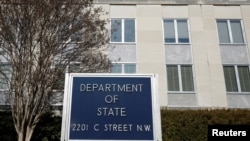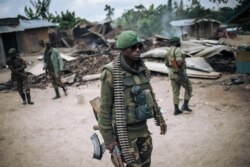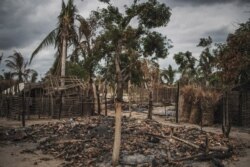Islamic State-linked groups in the Democratic Republic of Congo and Mozambique are the newest entries on a U.S. list of foreign terrorist groups, amid what experts say is a growing trend of violent extremism in Africa.
American counterterrorism officials say they’re doing everything they can to exorcise this violent threat, which directly impacts the safety, stability and security of important U.S. partner nations.
This week, the State Department designated two African groups — the Islamic State affiliate in Congo and the branch in Mozambique — as Foreign Terrorist Organizations. They join a long list of terror groups that include al-Qaida, Hamas and Hezbollah.
The group in Congo has been responsible for a series of especially violent attacks in the country’s volatile east that last year killed more than 849 civilians, according to United Nations reports. And the Mozambican group, which rose in 2017, is responsible for thousands of civilian deaths through a series of “large scale and sophisticated” attacks in the country’s north that has displaced nearly 670,000 people in recent months.
A designation is more than just a label, says John Godfrey, acting coordinator for counterterrorism and acting special envoy for the Global Coalition to Defeat ISIS (Islamic State). He spoke to journalists Thursday, via teleconference from Washington.
“In addition to naming and shaming, these designations also seek to deny ISIS in the DRC and ISIS in Mozambique as well as their leaders, Seka Musa Baluku and Abu Yasir Hassan, the resources they need to fund their terrorist activities and carry out terrorist attacks, among other consequences of those designations, any property or interests and property of those designated and subject to U.S. jurisdiction are blocked and U.S. persons are generally prohibited from engaging in any transactions with them,” he said.
“It is a crime to knowingly provide material support or resources to ISIS in the Democratic Republic of the Congo or to ISIS in Mozambique or to attempt or conspire to do so. Designations are one of the most important tools we have to disrupt the financial and other support networks that terrorist groups need to export violence and carry out attacks.”
Godfrey could not discuss classified information by telling journalists why American officials are so sure that these African groups are tied to the larger Islamic State, which planted its roots in Iraq and Syria. But, he said, the evidence of ties between ISIS in Mozambique and the main ISIS core in Iraq and Syria is “quite incontrovertible.” And in Congo, he said the United States is “quite confident” of a link to ISIS headquarters.
Michael Gonzales, deputy assistant secretary of the Bureau of African Affairs, also noted that the U.S. fights terrorism in a variety of ways. He described how they do so in Congo.
“We do support the FARDC [Congolese army] in terms of their efforts against violent extremists with particularly four lines of effort: bolstering civil-military operations and capabilities, military engineering, strategic communications and English-language laboratories with the goal of empowering civilian leadership to promote structural reform and professionalization of the military,” he said.
“I think these are prime examples of how the United States is really running with the vision of the Biden administration and then the statements of Secretary [of State Antony] Blinken about emphasizing our partnerships with African partners and building local capacity, because it's true that through local capacity that there will be sustainable gains that are able to be realized through the future.”
Godfrey emphasized that the approach is not new.
“The strategy we're currently working under in Cabo Delgado and in Mozambique is a continuation of work that began under the previous administration,” he said. “There certainly is a keen focus on the terrorist threat in Africa on the part of the Biden-Harris administration, but some of the lines of effort that we're currently working on there are ones that we've been formulating for a bit of time now.”
Cabo Delgado is a northern province in Mozambique.
And that is what both experts left unsaid: how long it might take to go from “naming and shaming” to actually defeating these groups. Eighteen of the designated foreign terrorist groups landed on the U.S. list in 1997. Al-Qaida has been on the list since 1999. Only 14 groups have been de-listed since 1997.
So how long will it take to vanquish these two new groups, which only started to show their mettle in the past three years? That, officials did not say.


